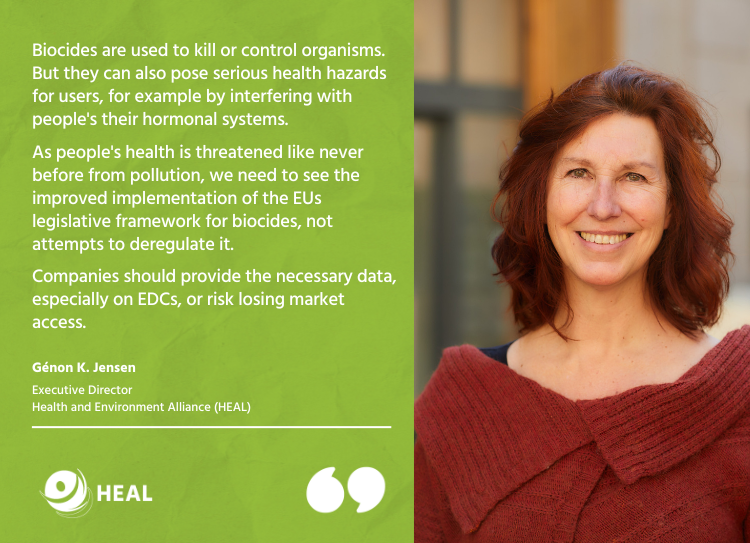In 2025, HEAL welcomed several new organisations into its international network of over 70 members committed to advancing health through environmental action. These new members bring valuable expertise in public health, environmental justice, and sustainable policy, further strengthening the capacity of the alliance to help face the challenges from biodiversity loss, pollution and climate change. Learn more about their missions and work below.
20 May 2021 – The use of persistent and health-harming PFAS chemicals in disposable food packaging and tableware is a widespread practice across Europe, as shown in a recent campaign and study undertaken by Czech NGO Arnika, in cooperation with the Health and Environment Alliance (HEAL), CHEM Trust and six other non-profit organisations in Europe [1]. Out of 42 samples sent for analysis, 32 samples including packaging from major global fast-food chains such as McDonalds, KFC, Subway or Dunkin Donuts showed an intentional treatment with PFAS [2].
Download the full study Throwaway Packaging, Forever Chemicals: European-wide survey of PFAS in disposable food packaging and tableware and the executive summary with recommendations
Our findings:
- PFAS are widely used in disposable food packaging and tableware in Europe. 38 out of the 99 samples (38%) collected from takeaways, supermarkets and e-shops in 6 European countries (Czech Republic, Denmark, France, Germany, the Netherlands and the United Kingdom) are suspected to have been treated with PFAS chemicals in order to achieve oil repellency.
- 32 out of 42 samples selected for chemical analysis (76%) show intentional treatment with PFAS.
- Traces of PFAS were detected in all samples selected for lab analysis, even samples not intentionally treated with PFAS.
- 99% of the organic fluorine present in selected samples is not captured by the laboratory’s compound-specific analysis of 55 PFAS, meaning it is impossible to identify the present PFAS compounds with certainty.
Why this matters:
PFAS (per- and polyfluoroalkyl substances) are also called “forever chemicals” because they are extremely persistent in nature, hardly decompose, and contaminate drinking water, soil or air. By definition and design, single-use packaging is thrown away immediately after being used. Because it is used in very high volumes, it creates a large amount of waste containing toxic PFAS chemicals. These forever chemicals especially pollute drinking water [3], therefore remaining and accumulating in the environment and the food chain.
Scientific studies have associated exposure to a number of PFAS with severe adverse health effects, including cancer, and impacts on the immune, reproductive and hormone systems, as well as with a reduced response to vaccinations [4]. In the context of food packaging, studies have shown that PFAS can migrate from the packaging into the food, adding to the overall PFAS exposure of the general population
“It is high time for the European Union to act and immediately and permanently ban the entire class of PFAS in food packaging, to protect the consumers in the first place. It is clearly not essential to use highly toxic and persistent chemicals, posing such a serious health and environmental risk, in throw-away food packaging, especially when there are safer alternatives,” says Jitka Strakova, the main author of the study and Arnika / International Pollutants Elimination Network (IPEN) science advisor.
Unnecessary uses, double standards and safer alternatives
Where regulation has been put in place, it has effectively incentivised companies to move away from using PFAS compounds. In Denmark, the use of forever chemicals in paper and board food packaging has been banned since July 2020. The study found that none of the sampled McDonald’s French fries bags bought in Denmark exhibited PFAS treatment. However, intentional PFAS treatment was found for the same items bought in the Czech Republic and the United Kingdom. This shows that legislation can and does protect people from exposure to harmful chemicals. It also highlights that the lack of EU-wide harmonised regulations for food contact materials results in different levels of protection across countries.
“When Europe’s stated objective is zero pollution for a non-toxic environment, we cannot accept that food packaging disposed of within a matter of minutes is treated with chemicals that persist and accumulate in the environment and are increasingly being associated with severe health impacts. The large European PFAS restriction under development is a once-in-a-century opportunity to address such uses and work towards phasing out the production and uses of PFAS, wherever they are unnecessary and it is possible,” says Natacha Cingotti, Health and Chemicals Lead at the Health and Environment Alliance (HEAL).
“PFAS pollution is so ubiquitous that we found PFAS even in products which have not been intentionally treated with these chemicals. The same PFAS contaminants have been found in the Arctic air, snow and wildlife. Every year of delay in regulating this group of ‘forever chemicals’ increases the pollution burden for future generations of people and wildlife. A ban on all non-essential uses of PFAS chemicals should be urgently implemented,” says Dr Julie Schneider, PFAS Campaigner at CHEM Trust.
As shown by the study, alternatives to PFAS-treated take-away packaging exist and are available on the market, including disposable paper and board packaging (e.g., sandwich and fries’ bags, and cardboard bakery and pizza boxes). Durable and reusable alternatives to moulded fibre tableware are also largely available for consumers, restaurants and retailers. The safest way for consumers is to move away from single-use packaging and to bring their own reusable containers when purchasing take-away food, according to the experts. To easily find out the presence of PFAS in fast-food packaging, consumers can do the bead test themselves.



